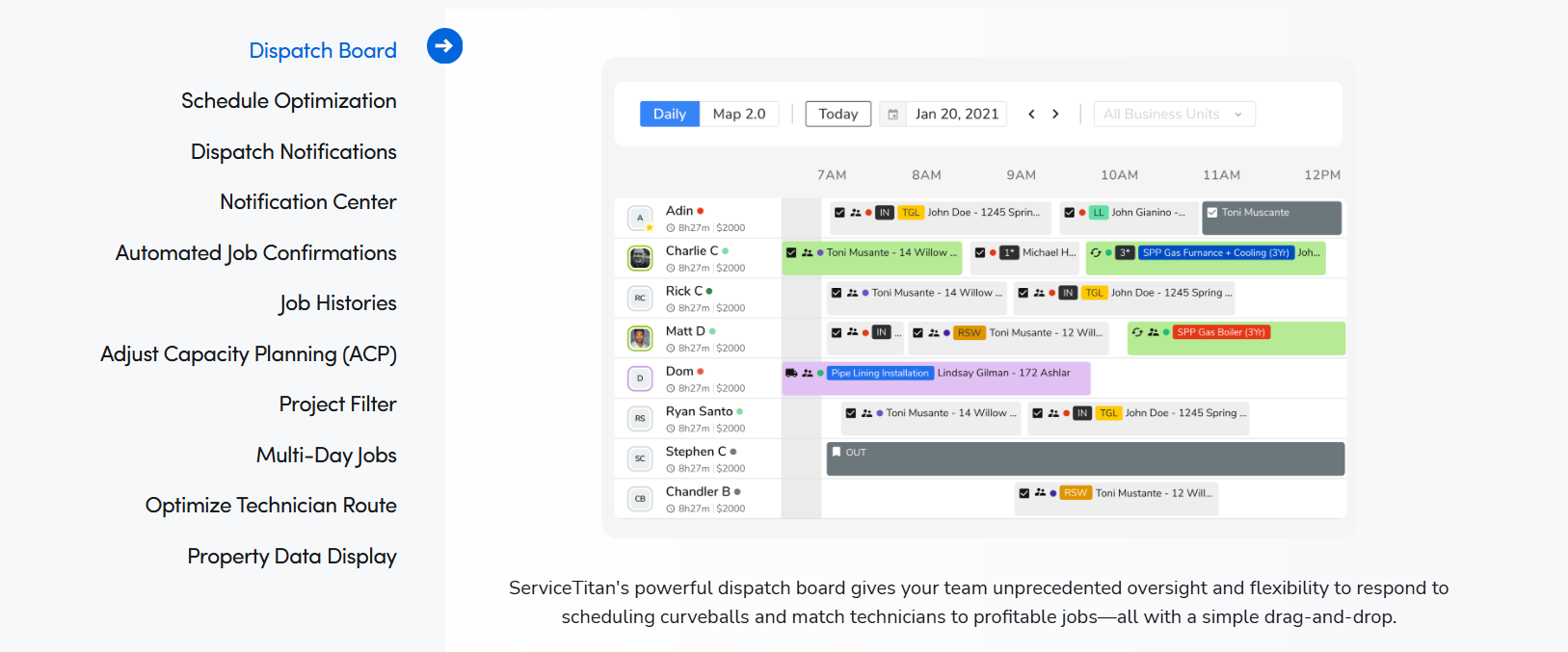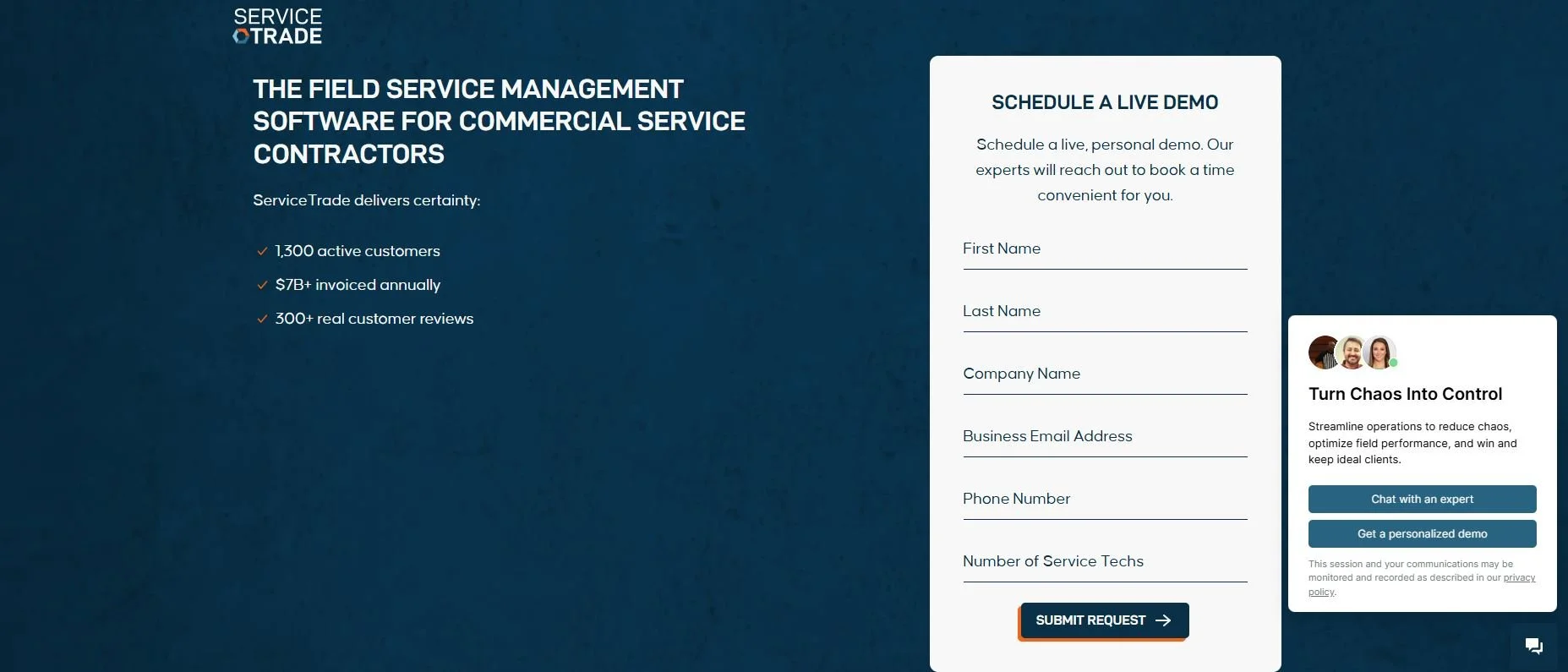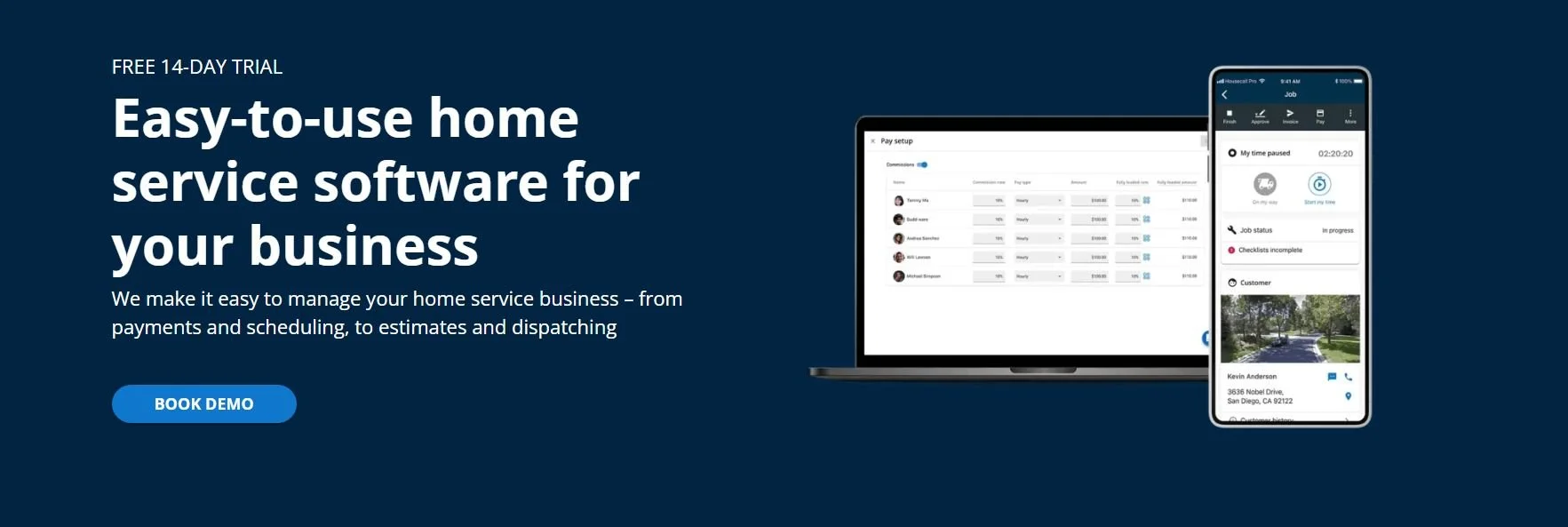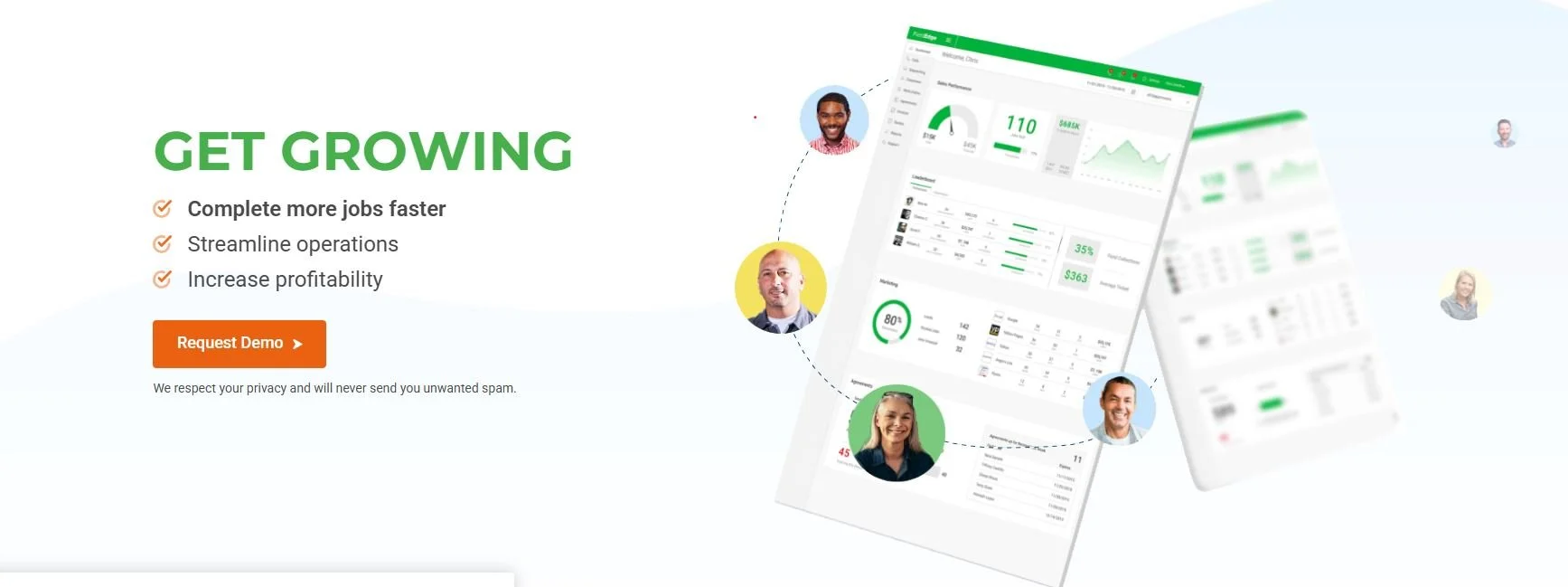5 Best HVAC CRM Options for 2025
The #1 reason an HVAC company needs a CRM (customer relationship management) system is to streamline operations and improve customer service, ultimately leading to increased revenue.
The right HVAC CRM system can transform how you run your business—from faster dispatching and smarter scheduling to better customer communication and more closed jobs. But with so many options out there, how do you choose the one that fits your operation best?
Whether you're a solo tech looking to streamline daily tasks or a multi-crew company ready to scale, there’s a CRM built for your workflow. In this guide, we break down the top HVAC CRMs based on real-world use cases, including:
In this guide, we will explore some of the best HVAC CRM systems and highlight what makes each one unique. We'll also help you decide which platform aligns with your business goals—and how to use it as a tool for growth and better marketing ROI.
Are you looking for the best HVAC CRM? Contact us at HomeRank Ads today and get assistance marketing your HVAC business!
1. Best HVAC CRM Comparison (2025)
Best Overall HVAC CRM:
ServiceTitan takes our top spot for its powerful, all-in-one platform designed to help HVAC companies scale with confidence. This HVAC CRM stands out as the most complete CRM for HVAC companies looking to scale. It combines deep analytics, dispatching, mobile tools, and advanced reporting in one robust platform. While it’s a higher investment, it’s built for businesses that want to grow smarter and faster.
HVAC CRM Comparison
1. ServiceTitan
Best For: Large, fast-growing HVAC businesses
Key Strengths: Deep analytics, advanced job costing, dispatch management, mobile-friendly tools
Considerations: Higher cost, longer onboarding time, better suited for teams ready to scale
2. Jobber
Best For: Small to mid-sized teams
Key Strengths: Easy to set up and use, great customer communication tools, affordable pricing
Considerations: Limited reporting, fewer customization options, no built-in marketing automation
3. ServiceTrade
Best For: Commercial HVAC companies with recurring contracts
Key Strengths: Strong asset tracking, visual documentation, branded service reports
Considerations: Not built for residential jobs, lacks marketing features, dated interface
4. Housecall Pro
Best For: Growing HVAC companies needing simplicity and automation
Key Strengths: Clean user experience, mobile functionality, basic marketing tools
Considerations: Advanced features behind paywalls, basic reporting, limited workflow customization
5. FieldEdge
Best For: Established HVAC businesses needing strong accounting integrations
Key Strengths: Excellent QuickBooks sync, service agreement management, long-term reliability
Considerations: Slower onboarding, dated UI, fewer modern marketing features
Read on to learn more about each of the top 5 HVAC CRM options on our list.
2. ServiceTitan: The Powerhouse for Large HVAC Businesses
If you're running a busy HVAC business with a full team of techs, incoming calls all day, and a growing customer base, ServiceTitan is likely the CRM built for you. It’s an all-in-one solution with powerful tools that go well beyond just scheduling and invoicing—it’s designed to help you scale.
ServiceTitan stands out with its advanced reporting and performance tracking. You can dig into real-time data on everything from technician efficiency to job profitability, helping you make smarter decisions about staffing, pricing, and marketing. It also has built-in tools for managing call booking, dispatching, follow-ups, and customer communications—plus full integration with QuickBooks.
Technicians can use the mobile app in the field to review job history, create estimates, collect payments, and update job status, which helps everyone stay on the same page.
If your HVAC company is growing fast and you need deeper insights into operations and profitability, ServiceTitan gives you enterprise-level control in one platform.
Pros:
Powerful performance tracking and job costing features
Supports large teams with robust dispatching and call booking tools
Mobile app lets techs invoice, collect payments, and update jobs on the go
Excellent for multi-location or franchise operations
QuickBooks integration and advanced reporting out of the box
Cons:
Higher cost compared to simpler CRMs
More features than most small businesses need
Setup and onboarding take time, especially for large teams
3. Jobber: The Best for Small to Mid-Sized Companies
For HVAC companies that are just starting out or growing steadily, Jobber offers a simple, straightforward way to stay organized without getting overwhelmed. It handles everything from scheduling and invoicing to reminders and customer communication—without the complexity of a large-scale platform.
The interface is clean and easy to navigate, and the mobile app makes it easy for technicians to stay updated while out in the field. One of Jobber’s strongest features is its built-in automation, which takes care of things like appointment reminders, follow-ups, and quote approvals—all helping you look more professional while saving time.
It also integrates with popular tools like QuickBooks and Stripe, so your payments and financials stay streamlined.
If you’re an HVAC business owner looking for a no-fuss platform that handles the essentials and keeps your team efficient, Jobber is a solid choice.
Pros:
Easy to set up and use—great for smaller teams
Automation tools for reminders, follow-ups, and quotes
Affordable pricing for early-stage or scaling businesses
Mobile app keeps techs connected on the go
QuickBooks and Stripe integrations for billing and payments
Cons:
Limited reporting and analytics compared to higher-end platforms
Not built for managing complex, multi-location operations
Lacks built-in marketing or email automation features
4. ServiceTrade: Ideal for Commercial HVAC Companies
If your HVAC company focuses on commercial clients—office buildings, schools, retail chains, or industrial sites—ServiceTrade is a smart fit. It’s built specifically to support long-term service relationships, recurring maintenance agreements, and detailed asset tracking.
What sets ServiceTrade apart is how it handles complex commercial workflows. You can attach equipment records to customer profiles, track service history down to individual units, and provide detailed reports that help customers stay compliant and informed. It’s a powerful tool for businesses that manage dozens (or hundreds) of recurring jobs across multiple locations.
Technicians in the field can add photos, notes, and signatures directly from the app, keeping everyone aligned on what’s been done and what’s next. And for office staff, the platform makes it easy to schedule follow-ups, log work orders, and keep clients in the loop with branded service reports.
If your bread and butter is commercial HVAC service—not one-off residential jobs—ServiceTrade is purpose-built to handle your operations.
Pros:
Ideal for recurring maintenance and multi-site commercial contracts
Tracks assets and service history in detail for each client
Field techs can easily document work with photos and notes
Generates branded reports to share with commercial clients
Improves transparency and accountability for long-term partnerships
Cons:
Less suited for residential or one-time service work
Interface is functional but not as modern as competitors
Doesn’t include built-in marketing or sales automation features
5. Housecall Pro: A User-Friendly CRM for Growing Businesses
If your HVAC business is picking up steam and you're ready to level up your tools without overwhelming your team, Housecall Pro is a user-friendly CRM that covers all the essentials—and then some. It’s built with growing service businesses in mind and balances ease of use with enough features to streamline day-to-day operations.
Housecall Pro lets you schedule jobs, send estimates, create invoices, and collect payments all from one place. It also offers a sleek mobile app, making it easy for techs to update job statuses, access work history, and communicate with the office in real time. One standout feature is the customer experience—it includes automated email and text updates that keep your customers informed at every step.
The software also includes basic marketing tools like email campaigns and postcard mailers, which is a nice bonus for businesses looking to stay top-of-mind with customers.
If you want something that’s intuitive, affordable, and built to grow with you, Housecall Pro is a great choice for HVAC companies on the rise.
Pros:
Easy to learn and use—minimal training required
Clean mobile app experience for techs
Built-in customer communication and appointment reminders
Offers light marketing features like postcards and emails
Transparent, tiered pricing based on features you need
Cons:
Some features (like advanced reporting) are gated behind higher-tier plans
Marketing tools are basic compared to standalone platforms
Limited customization options for complex workflows
6. FieldEdge: A Long-Standing Solution with Strong Integrations
FieldEdge has been around for decades and has carved out a strong niche with HVAC companies that want deep integration with QuickBooks and long-term reliability. It’s ideal for businesses that have outgrown basic tools and need a more structured system to manage service history, dispatching, estimates, and customer records.
One of FieldEdge’s core strengths is its tight syncing with QuickBooks, making billing and financial tracking almost seamless. It also includes sales enablement features like service agreement tracking and quoting tools that help boost revenue from repeat business.
Technicians can create quotes in the field and convert them into jobs with just a few taps, while dispatchers have real-time visibility into job progress and tech locations.
If you’ve been in business for a while and need a mature, feature-rich system that integrates cleanly with your accounting software, FieldEdge is worth a close look.
Pros:
Excellent QuickBooks integration for accounting and invoicing
Reliable platform with decades of HVAC industry use
Strong tools for managing service agreements and upsells
In-field quoting helps close jobs faster
Built for growing or established teams needing consistency
Cons:
Interface is a bit dated compared to newer platforms
Setup and onboarding can be time-consuming
Fewer built-in marketing features compared to competitors
7. Choosing the Right CRM for Your HVAC Business
Selecting the right HVAC CRM isn’t just about picking the most popular name—it’s about finding the right fit for your business’s size, growth stage, service type, and operational needs.
If you’re running a large or fast-growing HVAC company and need advanced tools to manage dispatching, performance tracking, and in-depth analytics, ServiceTitan is your best bet. It’s built for scale and offers robust reporting and automation to help you make data-driven decisions and run a tighter operation.
For small to mid-sized businesses, Jobber delivers excellent value with a clean, easy-to-use interface and essential features like scheduling, invoicing, and customer communication. It’s a great starting point for teams that want to stay organized without being bogged down by complexity.
If your focus is on commercial HVAC clients, ServiceTrade is purpose-built for recurring maintenance, long-term service agreements, and commercial asset tracking. It’s ideal for businesses that manage multiple locations and require professional-grade reporting.
Housecall Pro is a strong choice for growing HVAC companies that want something intuitive and budget-friendly. It covers all the basics—from scheduling to invoicing to customer updates—and includes light marketing features that help you stay top of mind.
Finally, FieldEdge is a dependable solution for more established HVAC businesses that need long-term stability, excellent QuickBooks integration, and deep functionality across dispatching, service agreements, and financial tracking.
No matter which platform you choose, investing in the right CRM can be a game changer—helping you streamline daily operations, boost customer satisfaction, and ultimately grow your revenue with less stress.
HomeRank Helps With All HVAC Sales and Marketing Needs
Whether you need a powerful all-in-one platform like ServiceTitan, a simple and affordable tool like Housecall Pro, or a tried-and-true solution like FieldEdge, there’s an HVAC CRM that aligns with your goals.
The key is choosing one that matches your business size, workflow, and long-term growth plan. The right CRM won’t just keep you organized—it will unlock new levels of efficiency, customer satisfaction, and profitability.
At HomeRank Ads, we specialize in helping HVAC companies turn great tools into real results. From CRM integration to high-performance Google Ads management, we’ll help you attract more leads and grow your business with confidence.
Ready to scale smarter? Contact us for expert support and proven HVAC marketing results.









